- Home
- Stacia Kane
Home
Home Read online
“Love is not the most powerful magic. But it feels like it is.”
—Truth for Teens, a Guidebook for the Young Adult, by Elder Carroll
Contents
1.
2.
3.
4.
5.
6.
About the Author
1.
Most—no, all—of her cases started the same way: A homeowner or building resident called the Church to report a haunting. The Church assigned a Debunker to the case to investigate the haunting and hopefully disprove it, to make sure the person in question wasn’t just faking in order to get a nice fat settlement in exchange for the Church’s failure to protect them from the dead.
After all, just because the population was smaller thanks to Haunted Week twenty-four years before, when the ghosts had risen and killed every living person they could, and just because the Church of Real Truth was in charge now, didn’t mean people didn’t still need money. They did. Just like Chess. She needed money for food, for rent, for the electric bill and the cell phone bill and all of those other things. And of course for drugs: the things that made her life worthwhile.
So Chess worked, and she worked hard, and she’d handled a lot of cases and gotten a lot of bonuses for disproving a lot of hauntings. But she’d never had a case before where a neighbor called the Church to report the ghost and the homeowners insisted there wasn’t one.
She’d rather not have the case. It was probably a huge waste of time; time she could be spending with Terrible, in his big gray bed. Just thinking about him made her smile, sent a cheerful little shiver up her spine. Love was terrifying, and weird, and sometimes uncomfortable. But it was so fucking sweet.
It was also going to fuck up her concentration if she didn’t stop thinking about it. With effort she tamped down the heat rising in her chest, reached into her pillbox and popped a couple of Cepts to help chase the feeling away.
The street looked like any other in Cross Town. Like any other street in any of the suburbs of Triumph City, really, or any in the District. Houses with smooth blank faces, all of them alike, watching each other across a wide expanse of concrete, two shiny cars in each driveway like weapons laid out on a table before them. So living-the-good-life. So upwardly mobile.
So rotten. The people living inside those assembly-line buildings were people who gave a shit what others thought of them, and that made them dangerous. That made them people who’d sell out their mothers if it meant getting into the right person’s address book.
Chess knocked on the pale blue front door of number 422, a bland two-story with peaked windows and a tiny afterthought of a front porch. The woman the door revealed when it opened looked like every self-satisfied suburban real-estate agent Chess had ever seen. The scent of smug drifted from her in waves.
“Yes?”
“Mrs. Brent?”
“Yes?”
“I’m Chess Putnam, from the Church. You made a complaint about a haunting—”
“Yes, yes, get inside. Hurry, please.” Mrs. Brent’s clawlike fingers wrapped around Chess’s upper arm and pulled, exhibiting the sort of wiry strength Chess usually associated with desperate speed-pumpers on a long run. Chess almost stumbled over the threshold; Mrs. Brent slammed the door behind her.
The second she flipped the lock, Mrs. Brent’s entire manner changed. Her face didn’t move—Chess didn’t think it was capable of that, not with all the surgeries and injections the woman had obviously had—but her shoulders relaxed, her back straightened.
“There. May I offer you a drink, Miss…Parkman, did you say? Are you related to Judge Parkman, by any chance?”
“It’s Putnam, actually. No, thank you, I don’t need a drink. Why don’t you just tell me about the ghost? What made you call the Church?”
Mrs. Brent motioned Chess into the wide living room to the left, so full of beige it was almost invisible: the interior design equivalent of a bowl of porridge. The couch was comfortable enough, though, especially when sweet opiate peace started drifting through Chess’s bloodstream from the Cepts she’d taken outside.
“I’ve been watching them.” Mrs. Brent sat too close, leaning in. Like she and Chess were pals or something. “I’ve seen the ghost. In their kitchen one night. In the living room another. All hours of the night it’s wandering around in there, glowing just like it has a right to be there. Just like it isn’t disgusting to—”
“How did you see this?” The last thing Chess needed was for Mrs. Brent to go off on an indignant little tangent. The sun had just started to set and the Runners were playing at Chuck’s later, and she was going to meet Terrible there and needed to get ready first. The sooner she left Mrs. Brent’s self-righteous pseudo-mansion the better.
The woman colored slightly beneath her stiff, ultra-frosted blonde hair and matching stiff, ultra-frosted makeup. “My kitchen windows face their house. I’ve been working on tracing some more ancestors lately—we go back over two hundred and fifty years, isn’t that wonderful?—so I’ve been in there working, making tea and such, you know. And from my desk there I can clearly see that ghost running around their house. It’s terrifying.”
Finally. “Can I see the kitchen?”
“Of course.”
Chess followed her down a hallway lined with posed family photos: Mrs. Brent, a balding man running to floridity and fat, two kids with toothy grins. Typical family. Typical house. So average they could move out and another family could move in and no one would even notice. Just being there made Chess itch.
“See? Right here. This is my desk.”
Not so much a desk as a section of granite countertop without a cabinet below, really, and two small drawers. Neat stacks of paper sat next to a closed laptop computer. The Brents were online, then. Good. Chess made a quick note in her pad: Check internet records re Brents. It wasn’t unheard of for people to conspire together, after all.
“When I sit here I see right through their windows, see?”
Right through was a bit of an exaggeration. Mrs. Brent wasn’t that much taller than Chess’s own five-foot-six, and Chess had to hold herself in a hunched sort of squat over the chair as if it were a public toilet in order to see the Solomon house. So Mrs. Brent was nosy. Not a surprise.
“I saw it more than once.” From her stack of papers Mrs. Brent produced what appeared to be a list, all typed out on plain white paper, printed in a “cheerful” font in bright green ink. “I’ve noted all the dates and times here, as you can see.”
Chess scanned it, pretended she cared. “Can I take this?”
“Of course, sure. That’s going to help you, right? I can testify. I’m ready to testify anytime. Those Solomons, her with her jingly jewelry and her tacky long skirts, and him, he’s some sort of…some sort of hippie, or something, he owns some organic store or something. Just look at their cars.”
Chess couldn’t. The house blocked them. Nor could she see in any other windows of the Solomon home, which belied Mrs. Brent’s statement, but whatever. Busybodies liked to exaggerate. It made them feel important. “Are there any other windows that face their house?”
“Just the landing.”
“Can you show me?”
Mrs. Brent kept up her stream of brittle chatter as she led Chess back down the hall and up the stairs—not about the Solomons anymore, but about the country club and some ball being held there, and her children’s school, and whatever other shit Chess didn’t give a fuck about. But from the landing Chess could indeed see into the Solomons’ living room, which Mrs. Brent termed “ghastly,” presumably because the Solomons had used colors that didn’t match their skin tone.
A little blue sportscar sat out front. That must have been the vehicle that annoyed Mrs. Brent, although Chess couldn’t figure out why. She su
pposed it looked like some sort of superfast threat, but only to someone who didn’t know anything about real cars. What it actually looked like was a midlife crisis. Terrible’s Chevelle would leave that thing in the dust.
“When they had their parties, people parked all over the lawn. Our lawn, too. Sometimes they’d leave tire marks. And—”
“Parties? They do that a lot?”
“Almost every weekend until a month or so ago, I think. Sometimes they have their parties in the dark, too. If you know what I mean.” Mrs. Brent’s mouth twisted in disapproval.
“They were having…adult parties?”
“I suppose you can call them that. All sorts of people, about a dozen, and they’d play music for an hour and then the lights would go off, and all we could see was maybe a little bit of light. And then everyone would leave a few hours later. I’m not complaining, but you tell me what normal kind of party only lasts until ten or eleven at night.”
How the fuck would Chess know? She’d never been invited to a party in her life, at least not as a guest. As a child—before the Church found her and made her a witch, made her one of them, gave her a real life—she’d been the entertainment at a few, sure, but she’d stopped looking at the clock early on, when she realized the hands only moved slower when she paid attention to them. And in Downside, where she lived, eleven at night was practically dawn. Things were just getting started.
“Is there anything else you can tell me, Mrs. Brent? Have you noticed any strange sounds coming from the house? Have you experienced anything—chills, things moving without you having moved them, feelings of being watched, that sort of thing?”
Mrs. Brent shook her head. “How can I keep that from happening? I have two children, Miss Pitman. I don’t want them in danger just because the Solomons live like hedonists.”
“Putnam. And I’m afraid there really isn’t, no. They don’t tend to drift much, though, not when they’re on their own. If there’s a ghost—”
“If? I’ve seen it. I know it’s there.”
“If there’s a ghost, it’s probably there for a reason. Some sort of connection to that house or that piece of land. That’s what we usually find, anyway. So chances are it won’t drift over here.”
Mrs. Brent followed Chess back down the stairs. “So when will you get rid of it? How long will that take?”
“I have to prove its existence first.”
“But I know it’s there. I saw it. You know, my husband went to school with Javier Ramos, the Elder, and I’m sure when he tells Javier about your refusal to—”
That was it. Chess stopped short on the stairs and fixed the woman’s plastic face with a dead-eye glare. “Mrs. Brent. I am following Church procedure, and Church procedure in these situations is very clear. Elder Ramos will tell you that himself. I assure you I’m going to do everything I can to keep you and your family—and the Solomons, and everyone else—safe. But it can’t be done in a day. Okay?”
Mrs. Brent sniffed. “Well, that’s fine, but I hope you have a resolution to this soon. I have a very important dinner party the week after next and I can’t risk something happening that night.”
Right. Never mind the possible deaths or anything. Never mind that ghosts were basically just killing machines and if the Solomons had one it was only a matter of time before the thing built up the strength to attack them, Mrs. Brent’s social standing was on the line. Another typical thing about this typical woman, and Chess was starting to choke on the thick fog of snobbish conformity polluting the air.
“I’ll keep that in mind.”
2.
Her mood didn’t improve until she got three Cepts into her stomach and her body into a warm shower to wash off the smell of suburban self-righteousness. Ugh. What a pain in the ass.
But, then, it was better than alternative pains in the ass. Certainly she was glad no one was trying to kill her and that she wasn’t having run-ins with powerful lunatics performing ritual sacrifices, like on her last case. That was something to be grateful for.
The other thing to be grateful for was sitting on her couch when she got out of the shower. Terrible. Her smile was so wide she felt like it stuck out past her cheeks.
She couldn’t help it. He was there, and she didn’t get to spend enough time with him—no amount of time would be enough—and they had the whole night. That was something to smile about, so she was going to.
He smiled, too, his smile that changed his whole face. Once—before she got to know him—she’d thought he was ugly, with his many-times-broken nose and harsh features and scars, his thick mutton chop sideburns and those dark hooded eyes that threatened so many people. Now she knew better. He looked like himself, and she loved him, and she could stare at his face for hours and not get bored. He looked better to her than anyone else in the world ever had.
He started to get up when she padded barefoot down her short hall into the living room. “Hey, Chess. You right?”
She pushed him down and plunked herself onto his lap. “Right up, yeah.”
“Aye?”
How did he do that? How did he manage to kiss her so little shocks ran through her body, so she felt warm and soft but electrified at the same time? However he did it, she hoped he’d never stop.
He pulled away, tugging at the towel she’d tucked around her. “Gots me an idea, now. Whyn’t you come on into bed with me, let me give you it.”
“What exactly is it that you want to give me?”
He gave a snort of laughter, but his mouth was busy on her collarbone, the base of her throat, where droplets of water still clung to her skin. “Give you whatany you want, Chessiebomb. Anything.”
“You don’t want to head out? We’re already late.”
“Be fast, aye?”
“No.” With effort—a hell of an effort, actually, because his hand had slipped under the towel and found one of his favorite spots—she slid off his lap back onto the couch. “Come on. I know you want to see the band, and—”
“Oh, aye.” But he pulled the towel completely open to fall on the cushion behind her, started kissing her neck again, right where he knew she liked it. Without her meaning it to, her head tilted to the right, giving him better access.
“You’re the one who said—”
His hand slid up her ribcage, over her breast, so lightly she felt it all the way through her body. “You so fuckin pretty, you got that?” The hand moved lower. “So pretty everywhere.”
She swallowed. Her mouth had gone so dry it was hard to talk. “To you, maybe.”
“Aye.” His lips moved further up her neck until he pulled away enough for their eyes to meet. “Aye, to me.”
This time the kiss was deeper, more forceful, more demanding. A demand she really had no desire to oppose.
She wrapped her arms around his neck. “Well…there’s an opening band anyway, right?”
Five hours later they stood together outside the Solomons’ home, the heavy-hot summer air damp around them. They’d left the Chevelle a block over so as not to attract attention, and even that short walk made Chess’s Bettie Page bangs spiky with sweat, especially after the oven-like heat inside Chuck’s. Chess hated summer.
“What you want? We head in, or do a check out here?”
“Just outside, tonight. I don’t have my Hand to deepen their sleep, and I didn’t get to check the doors and windows and stuff earlier since it was still light out.”
Their feet made faint rustling sounds through the tidy grass—shorter on the Brents’ side than the Solomons’, she noticed, the line of demarcation sharp and obvious. She imaged Mr. and Mrs. Brent tsk-tsking. Snobs.
Not that the Solomons weren’t snobs; they probably were, too. She’d find out later. For now she wanted to see what if anything she could discover before they learned she was investigating them.
The living room window on the left side of the house was the first to check, and it was one of several reasons she’d brought Terrible: it hung above her head, and he h
ad about a foot on her. Not only could he see through it, but those thick muscles he packed made it easy for him to lift her up, to hold her in place so she could take a good long look, too. The same size that made him the most feared enforcer in Downside made him the perfect partner for late-night investigations. Or, well, the perfect partner for anything, at least as far as she was concerned, but that was due to more than just how tall and strong he was.
She dragged her mind from those cheerful images and focused on the Solomon living room. Nothing special. Nothing special at all. A few bookshelves, a couch and easy chair, a widescreen TV. Macramé planters hanging from the ceiling. Prints on the walls, generic stuff like black-and-white pictures of the Golden Gate Bridge and some sort of hippie tie-dyed tapestry. On the side wall, though, on the other side of the kitchen…What was that?
She pressed her nose against the glass. Damn it, the Solomons had turned off their lights before bed—a pretty good indicator that they didn’t have ghosts. Most people suffering a real haunting made their homes so bright that sunglasses were required. Ghosts didn’t like the sun or light, so such action did occasionally help—not to mention the general fear of the dark, the almost instinctive way fearful people sought the light, tried to wrap it around themselves as if seeing a danger coming would make it go away.
It wouldn’t. It never did. Chess had learned that a long time ago.
But even in the dark, she could just make out the object sitting on a low table, next to the phone. “Shit.”
“What’s troubling?”
“Here, put me down. They’ve got a rat skull and spine in there, tied up with owl feathers.”
He obeyed. “Owls take ghosts down the City, aye? So they pullin shit with ghosts?”
Chess dusted her hands on her jeans—the windowsill hadn’t been exactly clean—and smiled at him. Of course he knew that. He knew it because of her, because he paid attention, and because he was so much smarter than he thought he was. “Yeah. They’re sometimes used in binding rituals. Like, Maguinness was bound to a ghost, remember? He used toad-magic and mistletoe, but a lot of people use rat skulls or spines.”

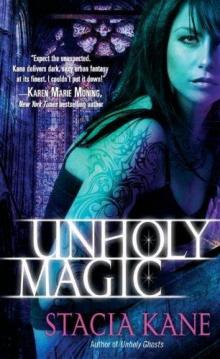 Unholy Magic
Unholy Magic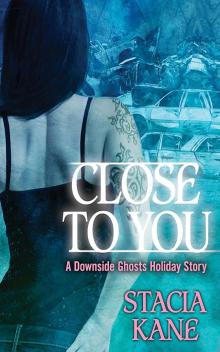 Close to You
Close to You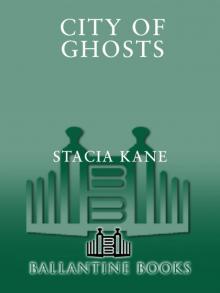 City of Ghosts
City of Ghosts Home
Home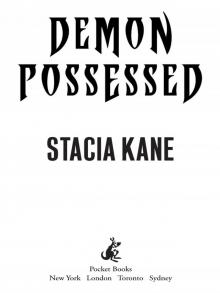 Demon Possessed
Demon Possessed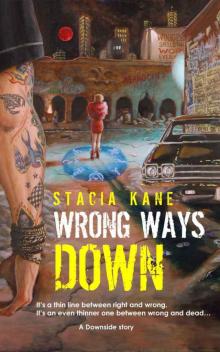 Wrong Ways Down
Wrong Ways Down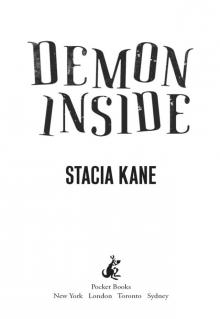 Demon Inside
Demon Inside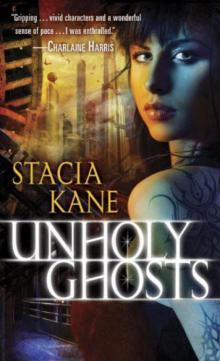 Unholy Ghosts
Unholy Ghosts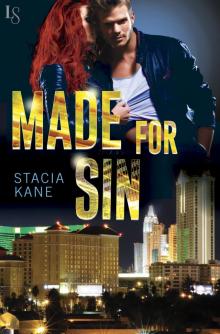 Made for Sin
Made for Sin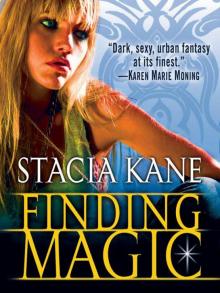 Finding Magic
Finding Magic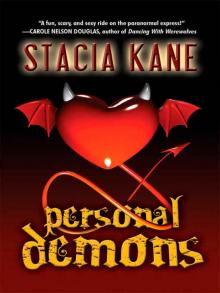 Personal Demons
Personal Demons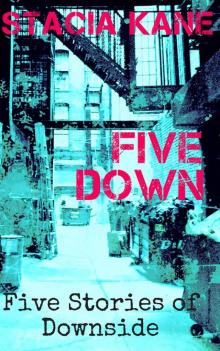 Five Down
Five Down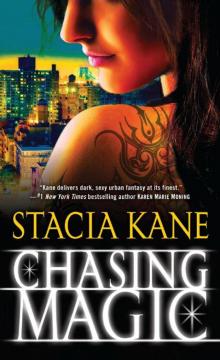 Chasing Magic
Chasing Magic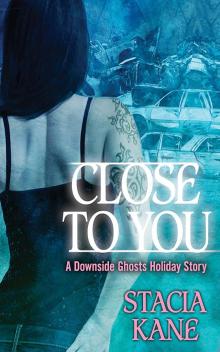 Close to You (downside ghosts )
Close to You (downside ghosts )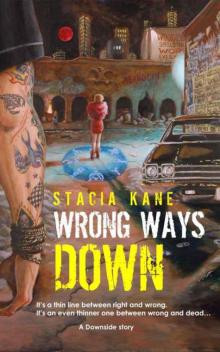 Wrong Ways Down (downside ghosts)
Wrong Ways Down (downside ghosts)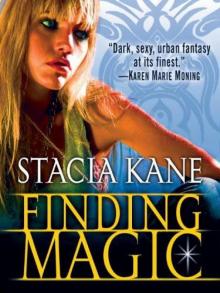 Finding Magic (downside ghosts)
Finding Magic (downside ghosts)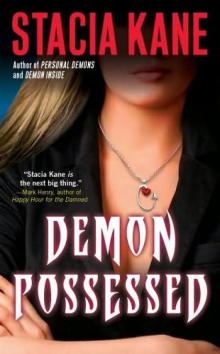 Demon Possessed mc-3
Demon Possessed mc-3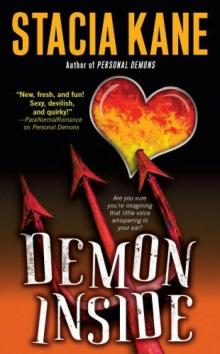 Personal Demons mc-2
Personal Demons mc-2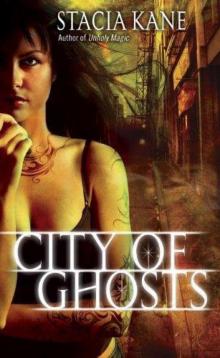 City of Ghosts dg-3
City of Ghosts dg-3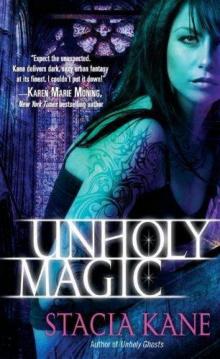 Unholy Magic dg-2
Unholy Magic dg-2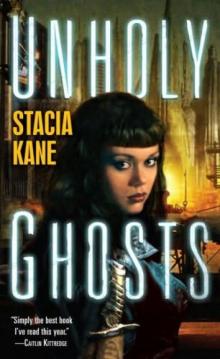 Unholy Ghosts dg-1
Unholy Ghosts dg-1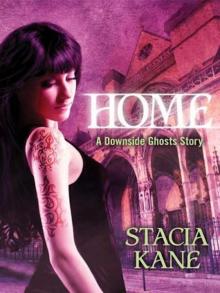 Home (downside ghosts )
Home (downside ghosts )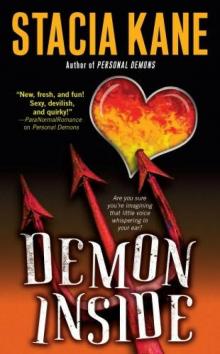 Demon Inside mc-2
Demon Inside mc-2